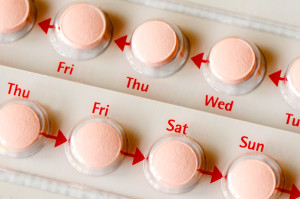Source:
http://natural-fertility-info.com/birth-control-pill-negatively-impacts-fertility.html
Top 5 Ways the Birth Control Pill Negatively Impacts Long-Term Fertility
How many women do you know that have taken the birth control pill? More than likely, it is almost all of them. The birth control pill is one of the most prescribed medications in the U.S. and not just for pregnancy prevention. What if I told you that the Pill, while freely taken by most women at some point in their life,
may actually not be good for long-term fertility?
Birth control is prescribed for preventing pregnancy and to control acne, but also for a variety of fertility issues such as endometriosis, PCOS, ovarian cysts, pain associated with fertility issues, PMS, and irregular menstrual cycles. Sounds pretty great, right? But, is it?
A simple internet search of the statement
how using birth control impacts fertility will lead you to a list of resources that say, to sum up the medical viewpoint, taking an oral contraceptive pill, aka the Pill, will not impact your future fertility.
Older studies (there are very few current studies), as well as articles on the web report that women who use birth control don’t have trouble conceiving naturally after stopping its use and get pregnant just as fast as other women, even if they’ve used birth control for years. In fact, one rather large study in which 2,000+ women reported, titled the
European Active Surveillance Study on Oral Contraceptives, concluded that “Previous oral-contraceptive use does not negatively affect initial and 1-year rates of pregnancy after oral-contraceptive cessation…”
Why then, are we seeing very different results with our clients? Each and every day we work with women who have stopped long-term birth control use (anywhere from 1 – 20 years of use) and now have any number of concerning fertility-related symptoms and health issues. Our abundance of case histories have lead us to believe that the answer is most certainly not black and white. We have learned that taking the Pill can negatively impact long-term fertility.
Prolonged use of birth control confuses the body and may negatively impact long-term fertility in the following ways…
1. Menstrual cycle disruption.FertilityFriend.com shares that studies show the following…
- 10.24% of all first cycles after discontinuing oral contraceptives were not ovulatory (compared with 3.44% of control group).
- Significant differences also appeared in the second and third cycles after discontinuing oral contraceptives.
- Cycles were longer in the post-pill group up to cycle number 12.
- Cycle disturbances (defined as a luteal phase length of less than 10 days or a cycle length greater than 35 days) were more frequent in the post-pill group until the seventh cycle.
- Cycle disturbances after discontinuing oral contraceptives were reversible but regulation took up to nine months or longer.
2. Hormone imbalance –Synthetic hormone-containing birth control may provide symptom relief, but it does not address the underlying imbalance that is fueling or contributing to the fertility issue being dealt with. What the Pill is doing is introducing synthetic forms of estrogen and progesterone to the body, which then prevent the body’s natural, beneficial hormones from bonding to hormone receptor sites. Introducing synthetic hormones into the body may further exacerbate hormone imbalance by overloading it.
3. Disrupted ovulation – The synthetic hormones contained in birth control regulate release and timing of specific hormones in the body to prevent ovulation. This is not how the normal release of hormones plays out in a naturally occurring menstrual cycle. It is necessary, as you know, to ovulate a mature, healthy follicle (egg) in order to achieve natural pregnancy. The Pill prevents the maturation of a follicle for ovulation, one of the ovaries most important jobs. Over time, the ovaries may “forget” how to do their job on their own because they haven’t been signaled with the right hormones at the correct time in the menstrual cycle.
4. Cervical mucus changes – The Pill has been shown to thicken cervical mucus so that sperm cannot reach the egg. Healthy cervical mucus is important for conception because it helps sperm travel through the vagina and the cervix to meet and fertilize an egg.
5. Changes the uterine lining –The Pill changes the uterine lining to make it unreceptive to the implantation of a fertilized egg. By controlling the body’s estrogen and progesterone levels with synthetic hormones, the Pill does not allow for the proper levels of progesterone to build a
healthy uterine lining for implantation.
Many women begin taking the pill at a very young age and don’t stop until they want to begin trying to conceive. The Pill doesn’t cause infertility, but impacts long-term fertility by “silencing a woman’s biological clock for so long that, in some cases, they forget it’s ticking away”. In other cases, women ignore or forget they are dealing with a fertility issue because the symptoms have gone away.
The bottom line is this,
women trying to control the symptoms of a fertility issue by taking the Pill are not addressing the underlying imbalance that is fueling, or contributing to the fertility issue.Instead, they are using a synthetic medication to control the symptoms of the problem while simultaneously allowing the body to defy nature.
Too learn more about related subjects covered in this article, please visit the following links:
How to Balance Your Hormones After Birth Control
Increase Cervical Mucous to Get Pregnant
References:
1. Barton, D. How to Balance Your Hormones After Birth Control: http://natural-fertility-info.com/birth-control-fertility.html
2. Birth Control Pills: http://www.healthywomen.org/condition/birth-control-pills
3. Birth Control Side Effects: What you don’t know could hurt you: http://www.floliving.com/birth-control-side-effects/
4. Can birth control now impact pregnancy later?: http://www.today.com/id/19803528/ns...trol-now-impact-pregnancy-later/#.VAoow6M8rB8
5. Crocker, Lizzie: Should You Quit the Pill?: http://www.thedailybeast.com/articl...rth-control-pill-s-negative-side-effects.html
6. Cronin, M. Schellschmidt, I. and Dinger, J. Rate of Pregnancy After Using Drospirenone and Other Progestin-Containing Oral Contraceptives: http://journals.lww.com/greenjourna...regnancy_After_Using_Drospirenone_and.20.aspx
7. Fertility After Oral Contraceptives: http://www.fertilityfriend.com/Faqs/Fertility-After-Oral-Contraceptives.html
.




 .
.

